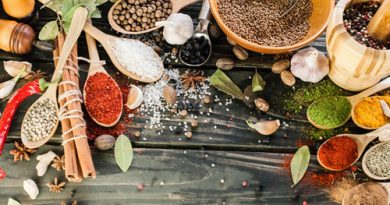10 Tips for Cooking When Living Alone
Living alone comes with its benefits – more space, no nagging and full control over the TV remote. However, cooking and eating alone can be uninspiring and many single people opt for nutrient-sparse take-out and ready meals.
Eating homemade meals is linked to higher fruit and vegetable consumption and greater diet variety. So, it’s important to incorporate cooking into your life as much as possible.
We’ve compiled 10 tips for cooking when living alone that will make the experience healthy, simple and more exciting.
1. Meal Prep
Meal planning and preparation are great hacks to improve your diet and help you to decide what to eat when you’re alone. Planning meals is associated with a healthier diet and body weight.
Meal prep involves setting aside a few hours during the week to cook in bulk. The meals are portioned into containers and stored in the fridge and freezer for easy access. It will save you time and is a good way to use up ingredients and avoid food wastage.
Some simple and healthy meal prep ideas include:
- soups
- stir-fried vegetables
- stews
- rice
- quinoa
- boiled eggs
- roasted vegetables
- hummus
- overnight oats
- sliced fruit
There may be nutrition programs for older adults or people with disabilities in your area. These services can assist with providing healthy home-cooked meals and meal plans for those living alone.
2. Shop Smart
Shopping for one can be tricky because there are often cheaper prices if you buy in bulk. It’s a good idea to purchase bigger quantities and ask friends, family or colleagues if they are willing to share with you.
Go shopping with a list and an idea of what you’ll be eating the following week to avoid buying unnecessary items that will go to waste.
Focus on buying versatile produce and ingredients that can be used to make multiple different snacks and meals. Potatoes, sweet potatoes, carrots and onions are adaptable and last a while which will help to create healthy, cheaper meals.
3. Learn Some One-Pot Recipes
A downside of living and cooking alone is that there is no one around to help with the cleanup. Learning to cook some tasty one-pot or one-pan meals can reduce the amount of cleaning at the end of the day. This could include omelettes, soups, curries, casseroles, grain salads, mixed vegetable pasta, bean chili, roast chicken and vegetables, grilled vegetables and fish.
4. Build Flavour
The thought of cooking and eating a flavourless meal alone is completely uninspiring. A helpful tip for solo cooking is to build a versatile base by cooking down chopped onion, garlic and red pepper and storing it in small batches. This can be added to mince, soups, curries, stews, and vegetable dishes for extra flavour.
5. Invest In a Few Appliances
Certain kitchen appliances will make cooking alone easier and more enjoyable. This includes items like a blender, slow cooker, food-processor and mini oven. These nifty pieces of equipment will allow you to quickly whip up healthy meals and snacks like smoothies, soups, chopped vegetables and dips.
6. Use a Slow Cooker
A slow cooker, sometimes known as a crock pot, is a great way to cook simple healthy meals and save time. Make a delicious stew by throwing in water, spices, chopped vegetables and meat of choice and leaving to cook. You can also cook up a nutritious broth with almost no effort by putting bones, water, celery, onion and seasoning into the slow cooker.
If you put the slow cooker on when you leave for work, you’ll have a healthy meal ready and warm when you get home in the evening.
7. Be Mindful of Portion Control
It’s easy to double up on portions when you are eating alone, which can lead to weight gain and other health issues.
Avoid this by using a slightly smaller plate, chewing your food slowly and putting aside leftovers when you are dishing up. This will stop you from going back for a second helping.
8. Find Inspiration
There’s an abundance of simple, healthy recipe websites and social media pages that will make your mouth water. If you’re lacking motivation or ideas for what to eat on your own, these online tools can be really useful.
9. Make Cooking Fun
It can be difficult to find the enthusiasm to cook a meal when you’re alone but changing your perspective may help. Think of cooking alone as an opportunity to relax, engage in self-care and have fun. Make your favourite drink and put on some music, a podcast, an audiobook or call a friend on speakerphone while you cook.
10. Cook with Others in Mind
Cooking is much more enjoyable when we have someone to share the experience with. Consider inviting friends for a meal in the evening, visiting a friend to cook for them or making extra food to share with neighbours and family.
Conclusion
Changing your habits to incorporate more cooking when living alone will take some time and effort. But once you start implementing these tips and cooking more fresh whole foods, your body will thank you!
Resources
https://www.ncbi.nlm.nih.gov/pmc/articles/PMC5561571/
https://www.ncbi.nlm.nih.gov/pmc/articles/PMC5288891/
https://www.healthline.com/nutrition/portion-control#section1
https://www.huffpost.com/entry/benefits-of-cooking-for-others_n_5967858ae4b0a0c6f1e67a15




